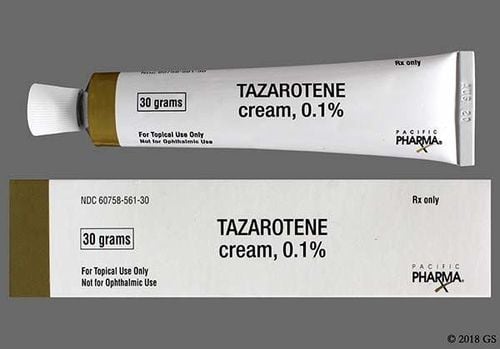This is an automatically translated article.
Multivitamins have been a commonly used supplement over the past few decades. Some people believe that multivitamins can improve health, make up for poor eating habits and even reduce the risk of chronic diseases, is that benefit really true? This article reviews the scientific evidence on multivitamins.1. What is a multivitamin?
Multivitamins are supplements that contain many different vitamins and minerals. Because there is no standard for what constitutes a multivitamin, their nutritional composition varies by brand and product. Multivitamins are also known as multiminerals, multis, multiples, or simply vitamin. They are available in many forms, including tablets, capsules, powders, and liquids.Most multivitamins should be taken once or twice daily. Multivitamins are available in pharmacies, stores, and supermarkets.
2. Composition of Multivitamins
Multivitamins contain 13 vitamins and at least 16 minerals that are essential for good health. Many of them aid in enzymatic reactions in the body or aid in function as signaling molecules or structural elements. The body also needs these nutrients to reproduce, maintain, grow, and regulate metabolic processes in the body.Multivitamins can provide a variety of vitamins and minerals but in different forms and amounts. They may also contain other ingredients such as herbs, amino acids, and fatty acids. Because supplements are not regulated by the Food and Drug Administration (FDA), multivitamins may contain higher or lower levels of nutrients than they state on the label.
In some cases, multivitamins may not even provide all of the nutrients listed. Therefore, it is important to purchase vitamins from a reputable manufacturer. Remember that the nutrients in a multivitamin can be obtained from real foods or created in a lab.
3. Multivitamins and heart disease
Heart disease is the leading cause of death worldwide. Many people believe that taking a multivitamin can help prevent heart disease, but the evidence is still unclear. Some studies show that multivitamins are associated with a reduced risk of heart attack and death, while others show no such effect. For more than a decade, the Physicians Health II study investigated the effects of daily multivitamin use in more than 14,000 middle-aged male physicians. It found no association with taking vitamin supplements and a reduction in heart attacks, strokes or death. A recent study revealed that among women taking a multivitamin for at least 3 years was associated with a 35% lower risk of dying from heart disease.
Nhiều. người tin rằng uống vitamin tổng hợp có thể giúp ngăn ngừa bệnh tim
4. Multivitamins and Cancer
The evidence regarding multivitamin use and cancer risk is also unclear. Some studies show that multivitamins do not reduce cancer risk. While other studies have linked the use of multivitamins with an increased risk of cancer.One review examined 5 randomized, controlled trials in 47,289 people. It found 31% lower cancer risk in men taking multivitamins but no effect in women
Two observational studies, one including women and the other including Men have combined long-term multivitamin use to reduce colon cancer risk.
The Doctor's Health Study II notes that long-term, daily multivitamin use reduces cancer risk in men with no history of cancer. However, it had no effect on reducing the risk of death during the study period.
5. Do multivitamins have any other health benefits?
Multivitamins have been studied for a number of other purposes, including brain function and eye health.5.1 Brain function
Some studies have found that multivitamins can improve memory in older adults. These supplements can also improve mood. Research shows a link not only between poor mood and nutrient deficiencies, but also between multivitamins and better mood or reduced symptoms of depression.5.2 Eye Health
Age-related macular degeneration is the leading cause of blindness worldwide. One study found that taking antioxidant vitamins and minerals could slow its growth. However, there is no evidence that these compounds prevent the disease in the first place. Some evidence indicates that multivitamins may reduce the risk of cataracts, another very common eye disease.6. Multivitamins Can Be Harmful In Some Situations
Dosage is an important factor to consider when taking a multivitamin. Although high doses of some vitamins and minerals are fine, for some vitamins if consumed in large amounts can cause serious harm. The appropriate dosage usually depends on solubility, where vitamins are classified into two groups:Water soluble: The body expels excess vitamins. Fat-soluble: Since the body has no easy way to get rid of these, excess can accumulate over the long term. Fat-soluble vitamins include A, D, E, and K. While vitamins E and K are relatively non-toxic, vitamins A and D can have toxic effects if abused. Pregnant women need to be especially careful with their vitamin A intake, as excess amounts have been linked to birth defects. Vitamin D toxicity is extremely rare and unlikely to develop from multivitamin use. However, vitamin A toxicity is more common. If you take a multivitamin and eat a lot of nutrient-dense foods, you can easily exceed the recommended daily intake of many nutrients. Minerals can also be harmful in high doses. For example, too much iron can be dangerous for people who don't need it. Another risk is faulty manufacturing, which can cause multivitamins to contain much larger amounts of nutrients than intended.

Lạm dụng vitamin A và D có thể gây tác dụng độc hại
7. Who should take a multivitamin?
Multivitamins are not suitable for everyone and may even be harmful to some individuals. However, certain groups of people may benefit from multivitamins, including:Elderly people; Absorption of vitamin B12 decreases with age. Older adults may also need more calcium and vitamin D. Vegetarian ; Because vitamin B12 is found only in animal foods. Therefore, the risk of vitamin B12 deficiency is higher if following a plant-based diet. You may also be deficient in calcium, zinc, iron, vitamin D and omega-3 fatty acids Pregnant and nursing women. These women should consult their health care provider, as some nutrients are harmful. For example, excess vitamin A can cause birth defects. Others who may benefit from multivitamins include people who have undergone weight loss surgery, are on a low-calorie diet, have a poor appetite, or have no appetite. Getting enough nutrients from eating only one food
Multivitamins are not a miracle for optimal health. Evidence that vitamin supplements improve health for most people is unclear. In some cases, they can even be harmful. If any nutrient is lacking, it is best to supplement with that specific nutrient. Also, you shouldn't take a multivitamin to correct a poor diet. Eating a balanced diet of fresh, whole foods will ensure good health in the long run.
Vinmec International General Hospital with a system of modern facilities, medical equipment and a team of experts and doctors with many years of experience in medical examination and treatment, patients can rest assured to visit. examination and treatment at the Hospital.
To register for examination and treatment at Vinmec International General Hospital, you can contact Vinmec Health System nationwide, or register online HERE.
Reference source: healthline.com













